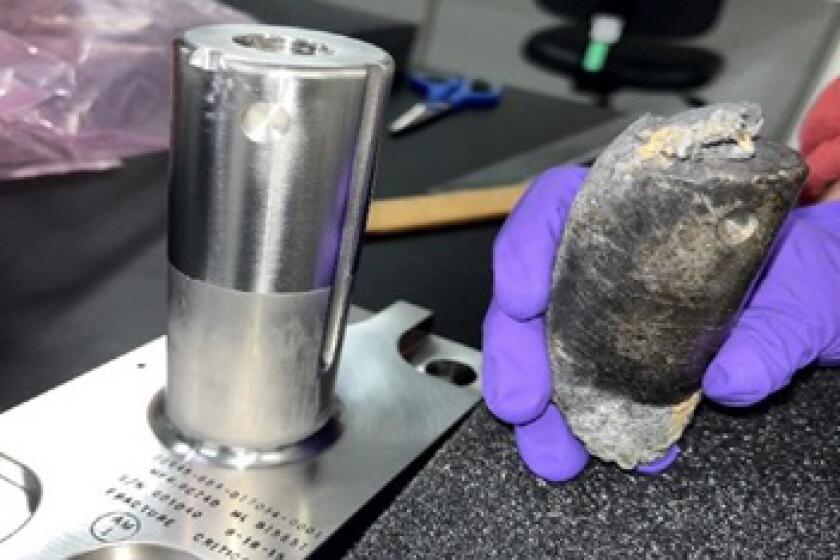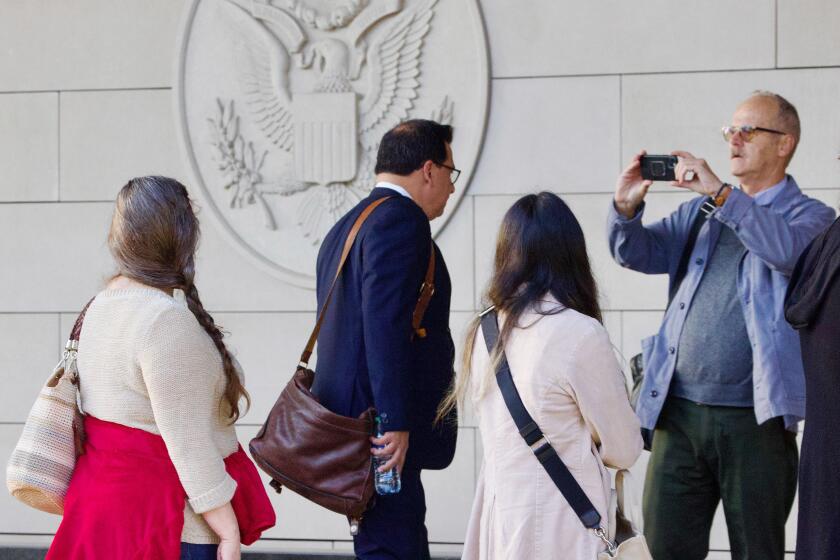County to Appeal Ruling Upholding Jail Suicide Award
Los Angeles County plans to appeal a federal appellate ruling upholding a $150,000 damage award to the family of a man who hanged himself in 1984 in the County Jail, Assistant County Counsel S. Robert Ambrose said Wednesday.
While the county does not accept blame for the inmate’s death, officials of the Sheriff’s Department and the county Mental Health Department said there have been substantial improvements in recent years in the psychiatric care offered inmates.
The U.S. 9th Circuit Court of Appeals said Dec. 28 that there was enough evidence to support a jury’s finding of “deliberate indifference” on the part of jail officials to Sergio Alvarez Cabrales’ need for psychiatric treatment.
“I plain disagree with the court’s decision,” Ambrose said. “ . . . There was no responsibility or liability of the Sheriff’s Department or any of the individuals involved and no violation of civil rights.”
Nevertheless, Cmdr. James Callas of the Sheriff’s Department’s Custody Division cited several changes in the years following Cabrales’ suicide, including the tripling of mental health professionals assigned to the jail.
“There definitely has been progress, in that inmates in the system have far greater access to psychiatric help than they ever had before,” Callas said.
Despite the improvements, however, three inmates took their own lives last year.
Dr. Eugene Kunzman, a psychiatrist and medical director of jail mental health services, said the staff increase, though sizable, “barely scratches the surface.” He estimated that a third of the inmates in County Jail “may be mentally dysfunctional in some way.”
According to Elsie Lu, deputy director of the county Mental Health Department, the typical jail suicide nationwide involves a young, white male, who kills himself within the first few days of his confinement.
“But here in L.A., I have not seen that to be the trend,” she said.
County Jail inmates who kill themselves tend to be Latinos who have been confined for a while and cannot bear the embarrassment of leaving jail and returning to the community, she said.
Solitary Confinement
In the Cabrales case, lawyers had argued that the Sheriff’s Department routinely violates state corrections policy by keeping inmates in solitary confinement longer than 10 days, and that this practice led to the inmate’s death.
Cabrales, 25, was found hanging from a towel rack in his cell more than 10 days after he was placed in solitary confinement as punishment for being involved in a fight. He had been diagnosed by a jail psychiatrist as a “schizotypal personality” and had previously made one suicide attempt.
Callas, who declined to discuss the Cabrales case, denied that the 10-day limit is being violated.
In the most recent change implemented at the jail, inmates with identified psychiatric problems are now being housed in multiple-person cells where they are not able to act out suicidal feelings, Callas said.
Cabrales’ attorneys had also argued that the jail was “seriously understaffed” with medical and psychiatric workers.
In October, 1983, when Cabrales was arrested on a burglary charge, the jail population was 6,060 and the facility was staffed with 48 mental health workers, including two psychiatrists, Lu said.
Today, with an inmate population approaching 7,200, the mental health staff is supposed to number 145, with nine full-time psychiatrists. About 20 positions are unfilled, however, according to Lu.
Five years ago, there were 123 so-called “mental health beds” for inmates with psychiatric problems. That number has been increased to 371. Of these, 35 beds are reserved in the hospital for inmates needing acute care.
The remainder of the beds, located in the hospital and elsewhere in the jail, are for inmates who are seen daily by someone on the psychiatric staff.
In addition, the county offers a voluntary follow-up program for inmates who are no longer in jail. Callas said the department recorded 10,000 such contacts with ex-inmates last year.
One of Cabrales’ attorneys, Stephen Yagman, said the improvements have been “marginal” and charged that the mental health care for inmates is “still grossly inadequate.”
Since 1975, 38 inmates have hanged themselves at the Men’s Central Jail, three of them in the past year.
Last year’s suicides included:
- Humberto Guerrero, 24, arrested for lewd conduct, on May 9. Guerrero was in a psychiatric observation section within the jail hospital because of suicidal tendencies. He had been seen by a staff counselor the morning of his death.
- Arthur Park, 38, arrested for possession of drug paraphernalia, on Sept. 29. He was in a single-man cell while awaiting a medical examination.
- Bruce Dauerman, 30, arrested for rape, on Nov. 2. He was housed in the acute-care section of the jail hospital and had been placed in restraints because of apparent self-destructive behavior and statements. The restraints were ordered removed by a nurse after he developed sores on his wrists.
Callas said some jail suicides are unavoidable.
“If anybody wants to kill himself badly enough, he will,” he said.
More to Read
Start your day right
Sign up for Essential California for news, features and recommendations from the L.A. Times and beyond in your inbox six days a week.
You may occasionally receive promotional content from the Los Angeles Times.






